Case Study on Volkswagen Emission Scandal
VerifiedAdded on 2021/01/01
|10
|2846
|399
AI Summary
Contribute Materials
Your contribution can guide someone’s learning journey. Share your
documents today.
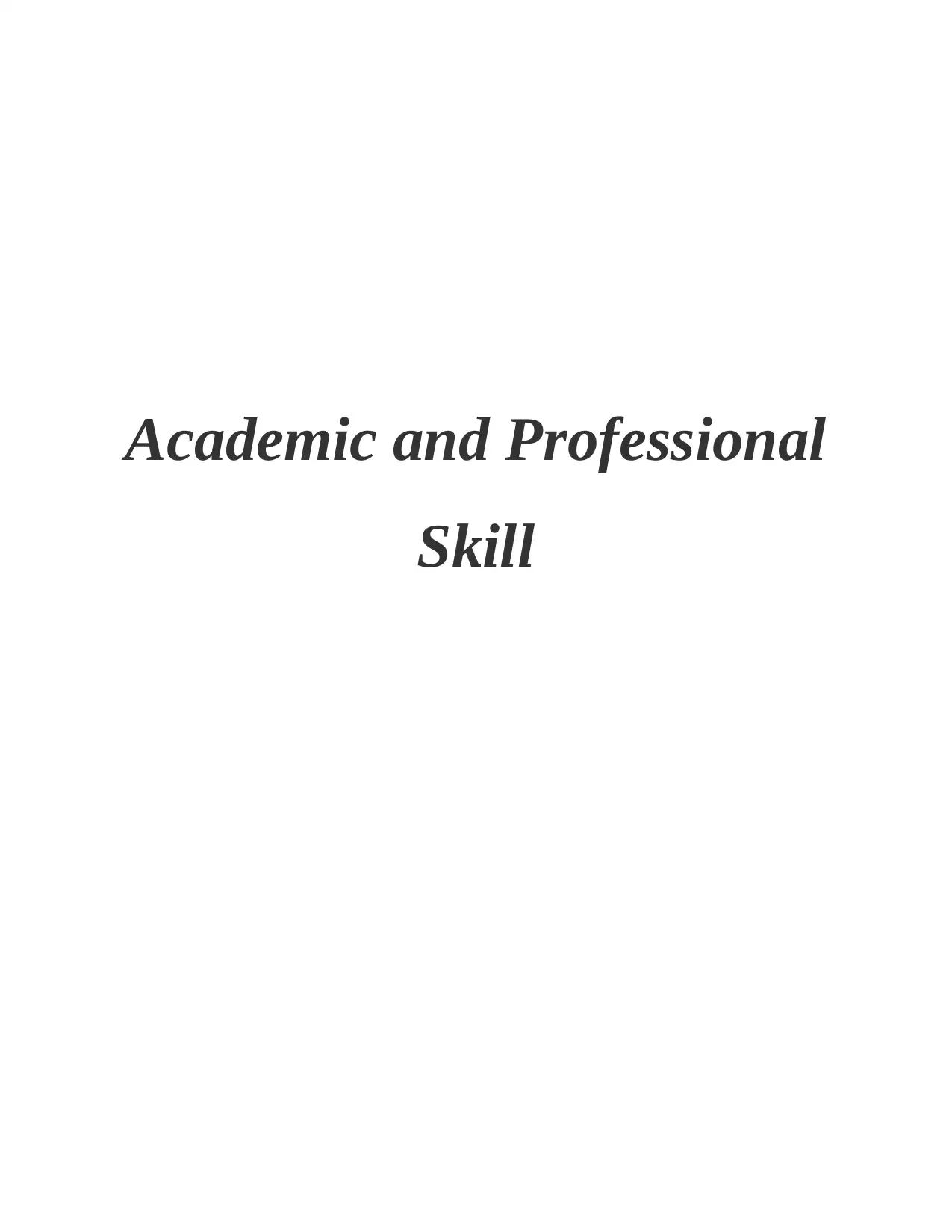
Academic and Professional
Skill
Skill
Secure Best Marks with AI Grader
Need help grading? Try our AI Grader for instant feedback on your assignments.
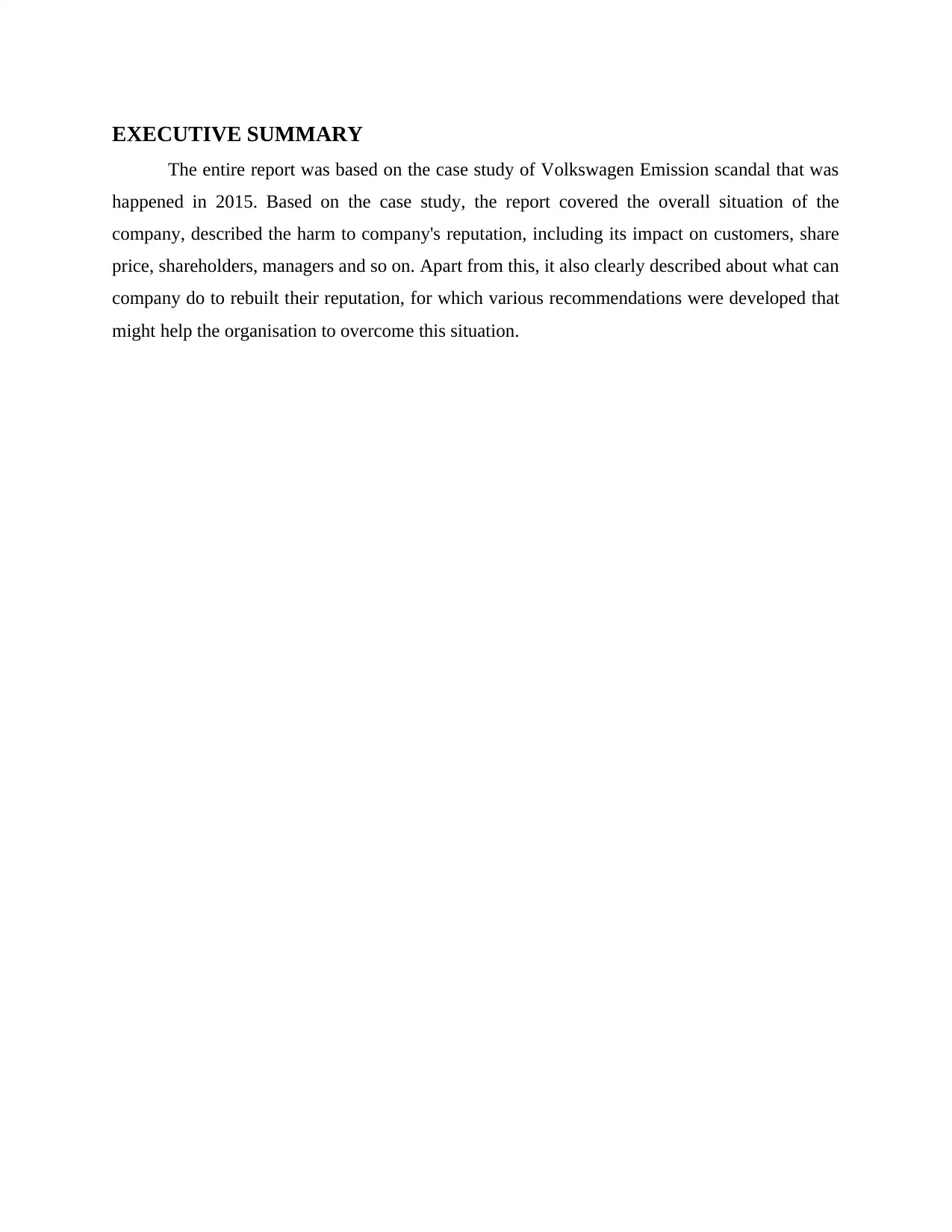
EXECUTIVE SUMMARY
The entire report was based on the case study of Volkswagen Emission scandal that was
happened in 2015. Based on the case study, the report covered the overall situation of the
company, described the harm to company's reputation, including its impact on customers, share
price, shareholders, managers and so on. Apart from this, it also clearly described about what can
company do to rebuilt their reputation, for which various recommendations were developed that
might help the organisation to overcome this situation.
The entire report was based on the case study of Volkswagen Emission scandal that was
happened in 2015. Based on the case study, the report covered the overall situation of the
company, described the harm to company's reputation, including its impact on customers, share
price, shareholders, managers and so on. Apart from this, it also clearly described about what can
company do to rebuilt their reputation, for which various recommendations were developed that
might help the organisation to overcome this situation.
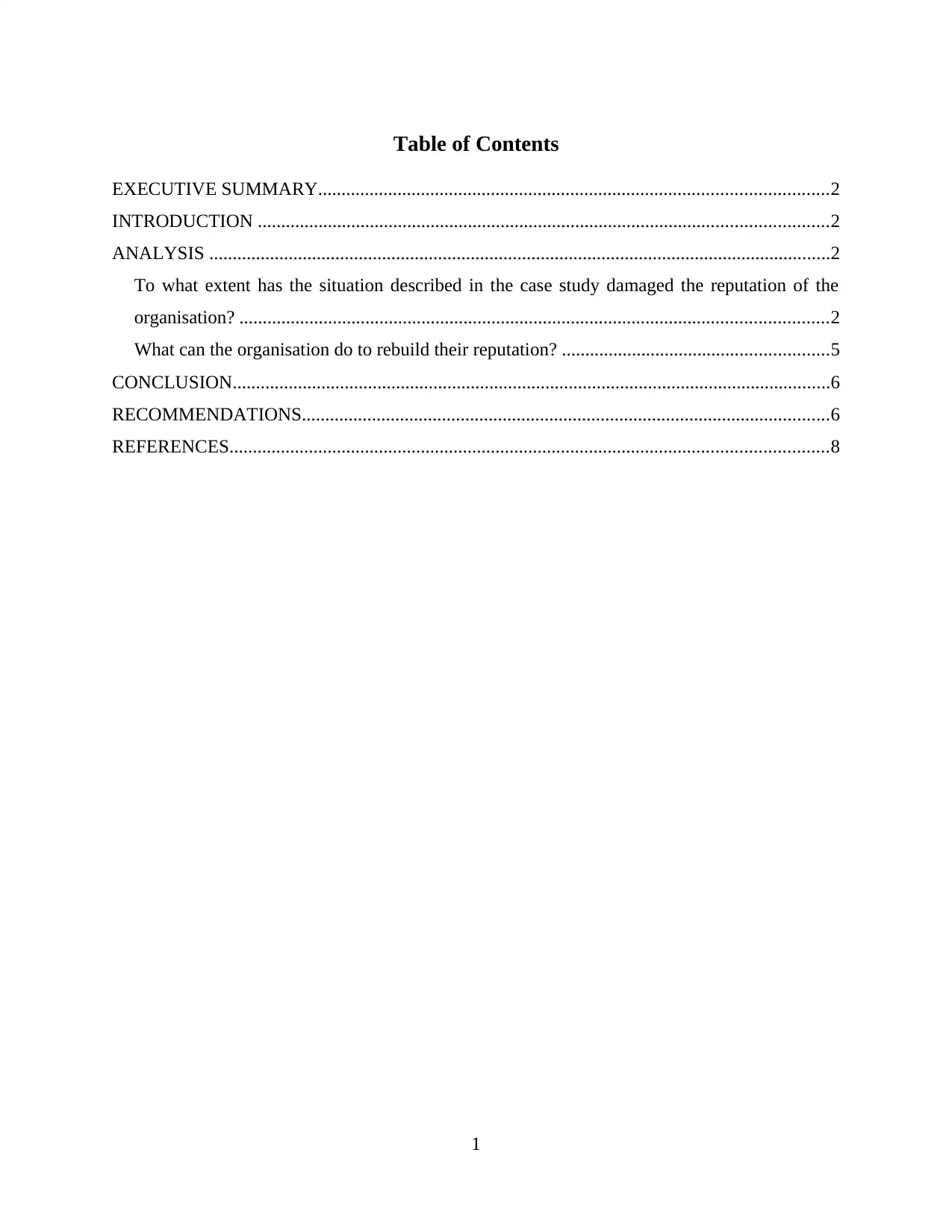
Table of Contents
EXECUTIVE SUMMARY.............................................................................................................2
INTRODUCTION ..........................................................................................................................2
ANALYSIS .....................................................................................................................................2
To what extent has the situation described in the case study damaged the reputation of the
organisation? ..............................................................................................................................2
What can the organisation do to rebuild their reputation? .........................................................5
CONCLUSION................................................................................................................................6
RECOMMENDATIONS.................................................................................................................6
REFERENCES................................................................................................................................8
1
EXECUTIVE SUMMARY.............................................................................................................2
INTRODUCTION ..........................................................................................................................2
ANALYSIS .....................................................................................................................................2
To what extent has the situation described in the case study damaged the reputation of the
organisation? ..............................................................................................................................2
What can the organisation do to rebuild their reputation? .........................................................5
CONCLUSION................................................................................................................................6
RECOMMENDATIONS.................................................................................................................6
REFERENCES................................................................................................................................8
1
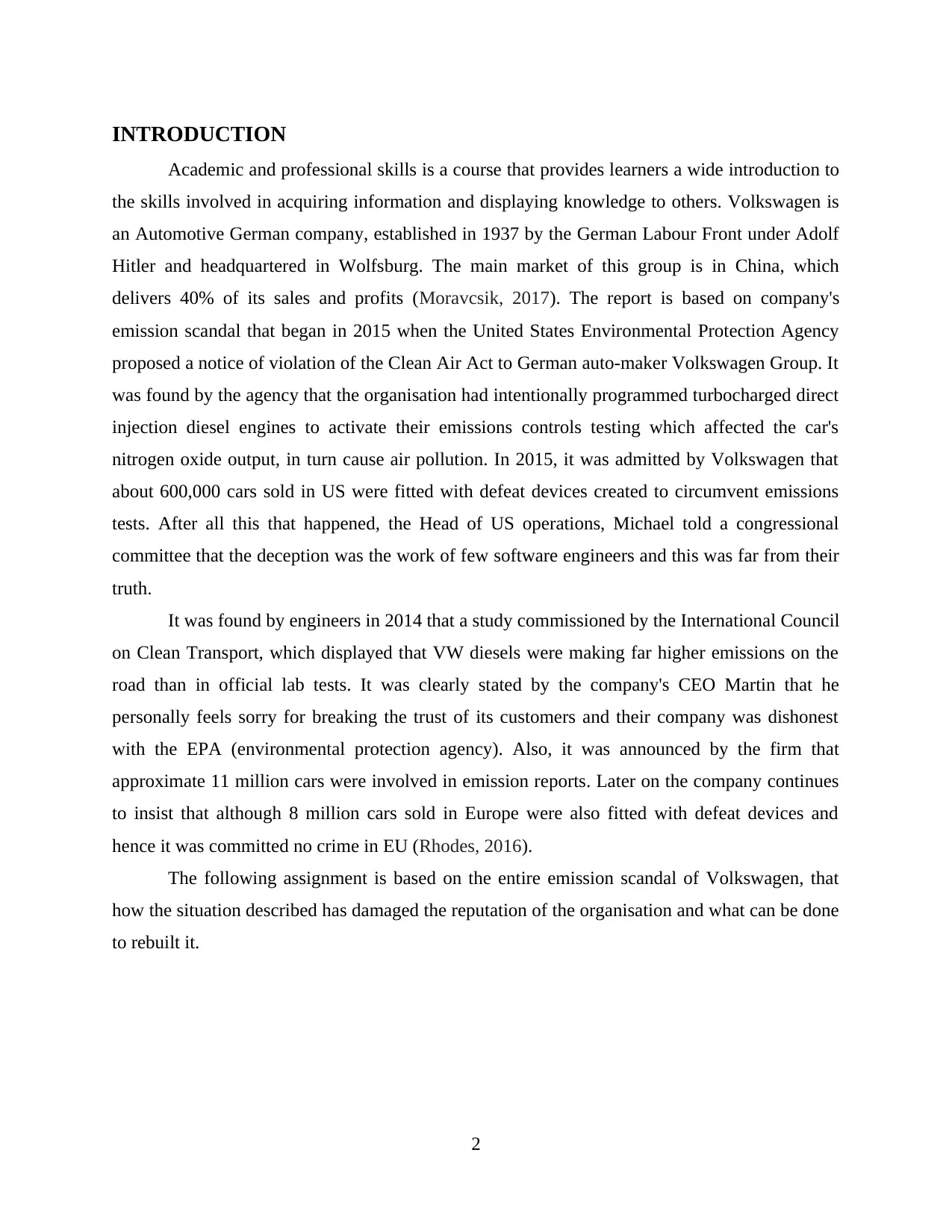
INTRODUCTION
Academic and professional skills is a course that provides learners a wide introduction to
the skills involved in acquiring information and displaying knowledge to others. Volkswagen is
an Automotive German company, established in 1937 by the German Labour Front under Adolf
Hitler and headquartered in Wolfsburg. The main market of this group is in China, which
delivers 40% of its sales and profits (Moravcsik, 2017). The report is based on company's
emission scandal that began in 2015 when the United States Environmental Protection Agency
proposed a notice of violation of the Clean Air Act to German auto-maker Volkswagen Group. It
was found by the agency that the organisation had intentionally programmed turbocharged direct
injection diesel engines to activate their emissions controls testing which affected the car's
nitrogen oxide output, in turn cause air pollution. In 2015, it was admitted by Volkswagen that
about 600,000 cars sold in US were fitted with defeat devices created to circumvent emissions
tests. After all this that happened, the Head of US operations, Michael told a congressional
committee that the deception was the work of few software engineers and this was far from their
truth.
It was found by engineers in 2014 that a study commissioned by the International Council
on Clean Transport, which displayed that VW diesels were making far higher emissions on the
road than in official lab tests. It was clearly stated by the company's CEO Martin that he
personally feels sorry for breaking the trust of its customers and their company was dishonest
with the EPA (environmental protection agency). Also, it was announced by the firm that
approximate 11 million cars were involved in emission reports. Later on the company continues
to insist that although 8 million cars sold in Europe were also fitted with defeat devices and
hence it was committed no crime in EU (Rhodes, 2016).
The following assignment is based on the entire emission scandal of Volkswagen, that
how the situation described has damaged the reputation of the organisation and what can be done
to rebuilt it.
2
Academic and professional skills is a course that provides learners a wide introduction to
the skills involved in acquiring information and displaying knowledge to others. Volkswagen is
an Automotive German company, established in 1937 by the German Labour Front under Adolf
Hitler and headquartered in Wolfsburg. The main market of this group is in China, which
delivers 40% of its sales and profits (Moravcsik, 2017). The report is based on company's
emission scandal that began in 2015 when the United States Environmental Protection Agency
proposed a notice of violation of the Clean Air Act to German auto-maker Volkswagen Group. It
was found by the agency that the organisation had intentionally programmed turbocharged direct
injection diesel engines to activate their emissions controls testing which affected the car's
nitrogen oxide output, in turn cause air pollution. In 2015, it was admitted by Volkswagen that
about 600,000 cars sold in US were fitted with defeat devices created to circumvent emissions
tests. After all this that happened, the Head of US operations, Michael told a congressional
committee that the deception was the work of few software engineers and this was far from their
truth.
It was found by engineers in 2014 that a study commissioned by the International Council
on Clean Transport, which displayed that VW diesels were making far higher emissions on the
road than in official lab tests. It was clearly stated by the company's CEO Martin that he
personally feels sorry for breaking the trust of its customers and their company was dishonest
with the EPA (environmental protection agency). Also, it was announced by the firm that
approximate 11 million cars were involved in emission reports. Later on the company continues
to insist that although 8 million cars sold in Europe were also fitted with defeat devices and
hence it was committed no crime in EU (Rhodes, 2016).
The following assignment is based on the entire emission scandal of Volkswagen, that
how the situation described has damaged the reputation of the organisation and what can be done
to rebuilt it.
2
Secure Best Marks with AI Grader
Need help grading? Try our AI Grader for instant feedback on your assignments.
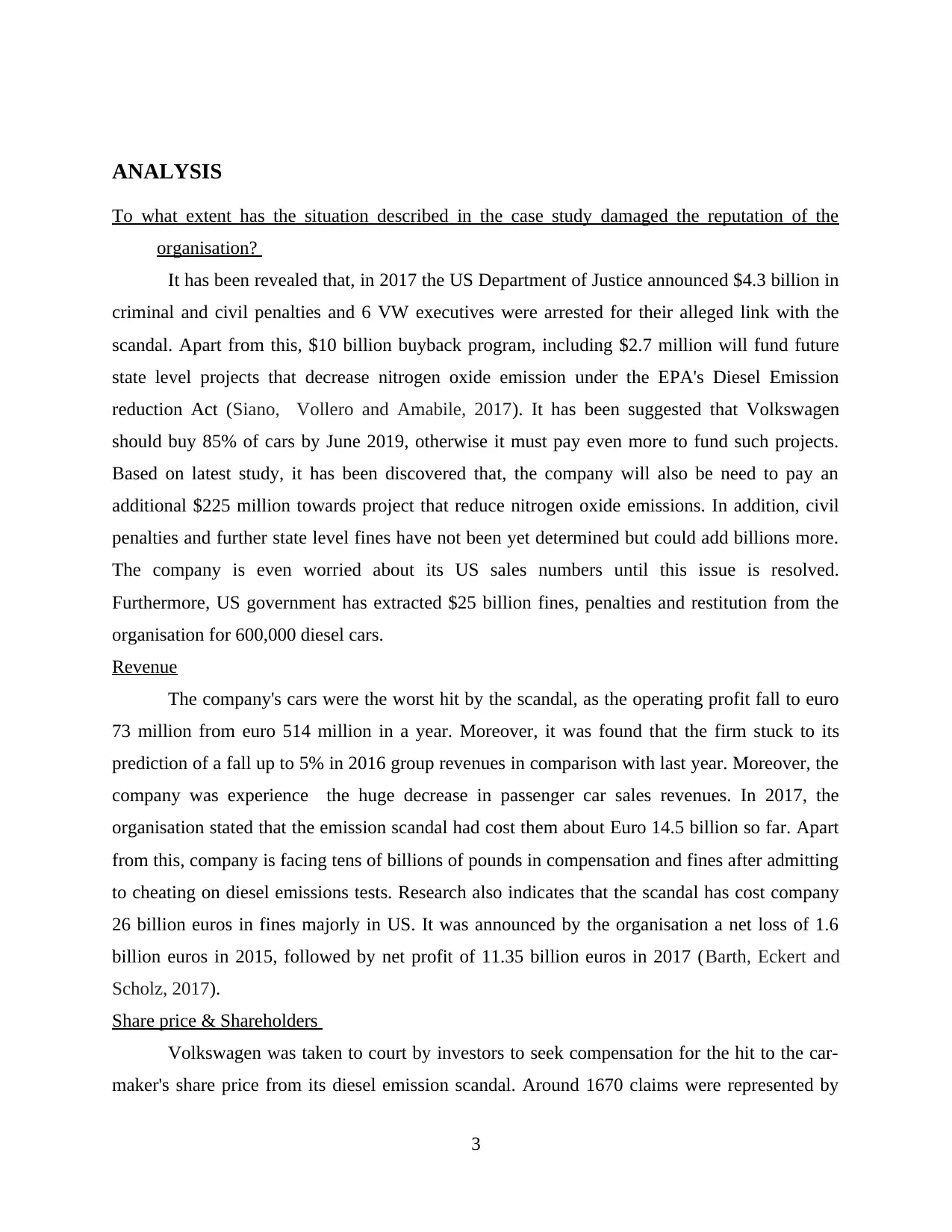
ANALYSIS
To what extent has the situation described in the case study damaged the reputation of the
organisation?
It has been revealed that, in 2017 the US Department of Justice announced $4.3 billion in
criminal and civil penalties and 6 VW executives were arrested for their alleged link with the
scandal. Apart from this, $10 billion buyback program, including $2.7 million will fund future
state level projects that decrease nitrogen oxide emission under the EPA's Diesel Emission
reduction Act (Siano, Vollero and Amabile, 2017). It has been suggested that Volkswagen
should buy 85% of cars by June 2019, otherwise it must pay even more to fund such projects.
Based on latest study, it has been discovered that, the company will also be need to pay an
additional $225 million towards project that reduce nitrogen oxide emissions. In addition, civil
penalties and further state level fines have not been yet determined but could add billions more.
The company is even worried about its US sales numbers until this issue is resolved.
Furthermore, US government has extracted $25 billion fines, penalties and restitution from the
organisation for 600,000 diesel cars.
Revenue
The company's cars were the worst hit by the scandal, as the operating profit fall to euro
73 million from euro 514 million in a year. Moreover, it was found that the firm stuck to its
prediction of a fall up to 5% in 2016 group revenues in comparison with last year. Moreover, the
company was experience the huge decrease in passenger car sales revenues. In 2017, the
organisation stated that the emission scandal had cost them about Euro 14.5 billion so far. Apart
from this, company is facing tens of billions of pounds in compensation and fines after admitting
to cheating on diesel emissions tests. Research also indicates that the scandal has cost company
26 billion euros in fines majorly in US. It was announced by the organisation a net loss of 1.6
billion euros in 2015, followed by net profit of 11.35 billion euros in 2017 (Barth, Eckert and
Scholz, 2017).
Share price & Shareholders
Volkswagen was taken to court by investors to seek compensation for the hit to the car-
maker's share price from its diesel emission scandal. Around 1670 claims were represented by
3
To what extent has the situation described in the case study damaged the reputation of the
organisation?
It has been revealed that, in 2017 the US Department of Justice announced $4.3 billion in
criminal and civil penalties and 6 VW executives were arrested for their alleged link with the
scandal. Apart from this, $10 billion buyback program, including $2.7 million will fund future
state level projects that decrease nitrogen oxide emission under the EPA's Diesel Emission
reduction Act (Siano, Vollero and Amabile, 2017). It has been suggested that Volkswagen
should buy 85% of cars by June 2019, otherwise it must pay even more to fund such projects.
Based on latest study, it has been discovered that, the company will also be need to pay an
additional $225 million towards project that reduce nitrogen oxide emissions. In addition, civil
penalties and further state level fines have not been yet determined but could add billions more.
The company is even worried about its US sales numbers until this issue is resolved.
Furthermore, US government has extracted $25 billion fines, penalties and restitution from the
organisation for 600,000 diesel cars.
Revenue
The company's cars were the worst hit by the scandal, as the operating profit fall to euro
73 million from euro 514 million in a year. Moreover, it was found that the firm stuck to its
prediction of a fall up to 5% in 2016 group revenues in comparison with last year. Moreover, the
company was experience the huge decrease in passenger car sales revenues. In 2017, the
organisation stated that the emission scandal had cost them about Euro 14.5 billion so far. Apart
from this, company is facing tens of billions of pounds in compensation and fines after admitting
to cheating on diesel emissions tests. Research also indicates that the scandal has cost company
26 billion euros in fines majorly in US. It was announced by the organisation a net loss of 1.6
billion euros in 2015, followed by net profit of 11.35 billion euros in 2017 (Barth, Eckert and
Scholz, 2017).
Share price & Shareholders
Volkswagen was taken to court by investors to seek compensation for the hit to the car-
maker's share price from its diesel emission scandal. Around 1670 claims were represented by
3
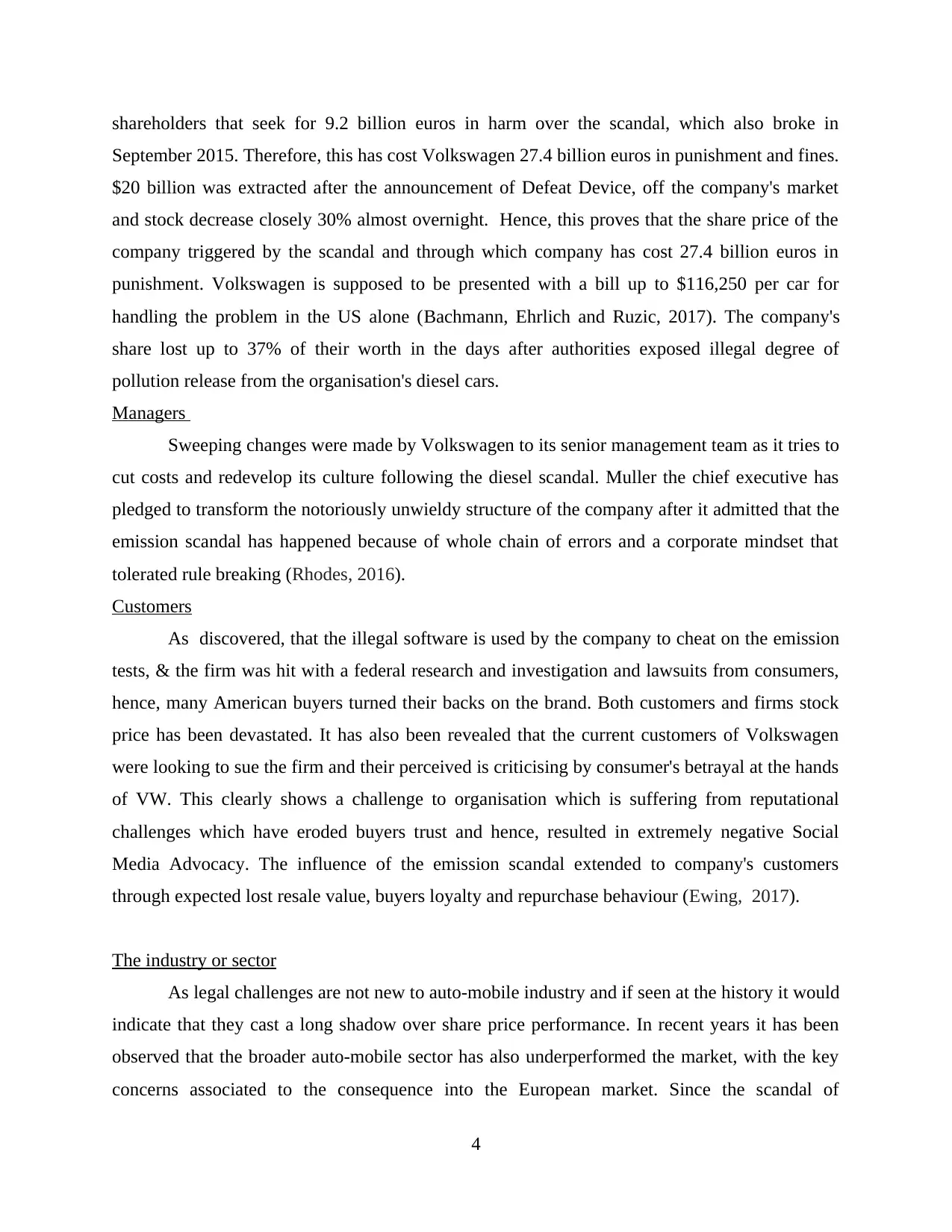
shareholders that seek for 9.2 billion euros in harm over the scandal, which also broke in
September 2015. Therefore, this has cost Volkswagen 27.4 billion euros in punishment and fines.
$20 billion was extracted after the announcement of Defeat Device, off the company's market
and stock decrease closely 30% almost overnight. Hence, this proves that the share price of the
company triggered by the scandal and through which company has cost 27.4 billion euros in
punishment. Volkswagen is supposed to be presented with a bill up to $116,250 per car for
handling the problem in the US alone (Bachmann, Ehrlich and Ruzic, 2017). The company's
share lost up to 37% of their worth in the days after authorities exposed illegal degree of
pollution release from the organisation's diesel cars.
Managers
Sweeping changes were made by Volkswagen to its senior management team as it tries to
cut costs and redevelop its culture following the diesel scandal. Muller the chief executive has
pledged to transform the notoriously unwieldy structure of the company after it admitted that the
emission scandal has happened because of whole chain of errors and a corporate mindset that
tolerated rule breaking (Rhodes, 2016).
Customers
As discovered, that the illegal software is used by the company to cheat on the emission
tests, & the firm was hit with a federal research and investigation and lawsuits from consumers,
hence, many American buyers turned their backs on the brand. Both customers and firms stock
price has been devastated. It has also been revealed that the current customers of Volkswagen
were looking to sue the firm and their perceived is criticising by consumer's betrayal at the hands
of VW. This clearly shows a challenge to organisation which is suffering from reputational
challenges which have eroded buyers trust and hence, resulted in extremely negative Social
Media Advocacy. The influence of the emission scandal extended to company's customers
through expected lost resale value, buyers loyalty and repurchase behaviour (Ewing, 2017).
The industry or sector
As legal challenges are not new to auto-mobile industry and if seen at the history it would
indicate that they cast a long shadow over share price performance. In recent years it has been
observed that the broader auto-mobile sector has also underperformed the market, with the key
concerns associated to the consequence into the European market. Since the scandal of
4
September 2015. Therefore, this has cost Volkswagen 27.4 billion euros in punishment and fines.
$20 billion was extracted after the announcement of Defeat Device, off the company's market
and stock decrease closely 30% almost overnight. Hence, this proves that the share price of the
company triggered by the scandal and through which company has cost 27.4 billion euros in
punishment. Volkswagen is supposed to be presented with a bill up to $116,250 per car for
handling the problem in the US alone (Bachmann, Ehrlich and Ruzic, 2017). The company's
share lost up to 37% of their worth in the days after authorities exposed illegal degree of
pollution release from the organisation's diesel cars.
Managers
Sweeping changes were made by Volkswagen to its senior management team as it tries to
cut costs and redevelop its culture following the diesel scandal. Muller the chief executive has
pledged to transform the notoriously unwieldy structure of the company after it admitted that the
emission scandal has happened because of whole chain of errors and a corporate mindset that
tolerated rule breaking (Rhodes, 2016).
Customers
As discovered, that the illegal software is used by the company to cheat on the emission
tests, & the firm was hit with a federal research and investigation and lawsuits from consumers,
hence, many American buyers turned their backs on the brand. Both customers and firms stock
price has been devastated. It has also been revealed that the current customers of Volkswagen
were looking to sue the firm and their perceived is criticising by consumer's betrayal at the hands
of VW. This clearly shows a challenge to organisation which is suffering from reputational
challenges which have eroded buyers trust and hence, resulted in extremely negative Social
Media Advocacy. The influence of the emission scandal extended to company's customers
through expected lost resale value, buyers loyalty and repurchase behaviour (Ewing, 2017).
The industry or sector
As legal challenges are not new to auto-mobile industry and if seen at the history it would
indicate that they cast a long shadow over share price performance. In recent years it has been
observed that the broader auto-mobile sector has also underperformed the market, with the key
concerns associated to the consequence into the European market. Since the scandal of
4
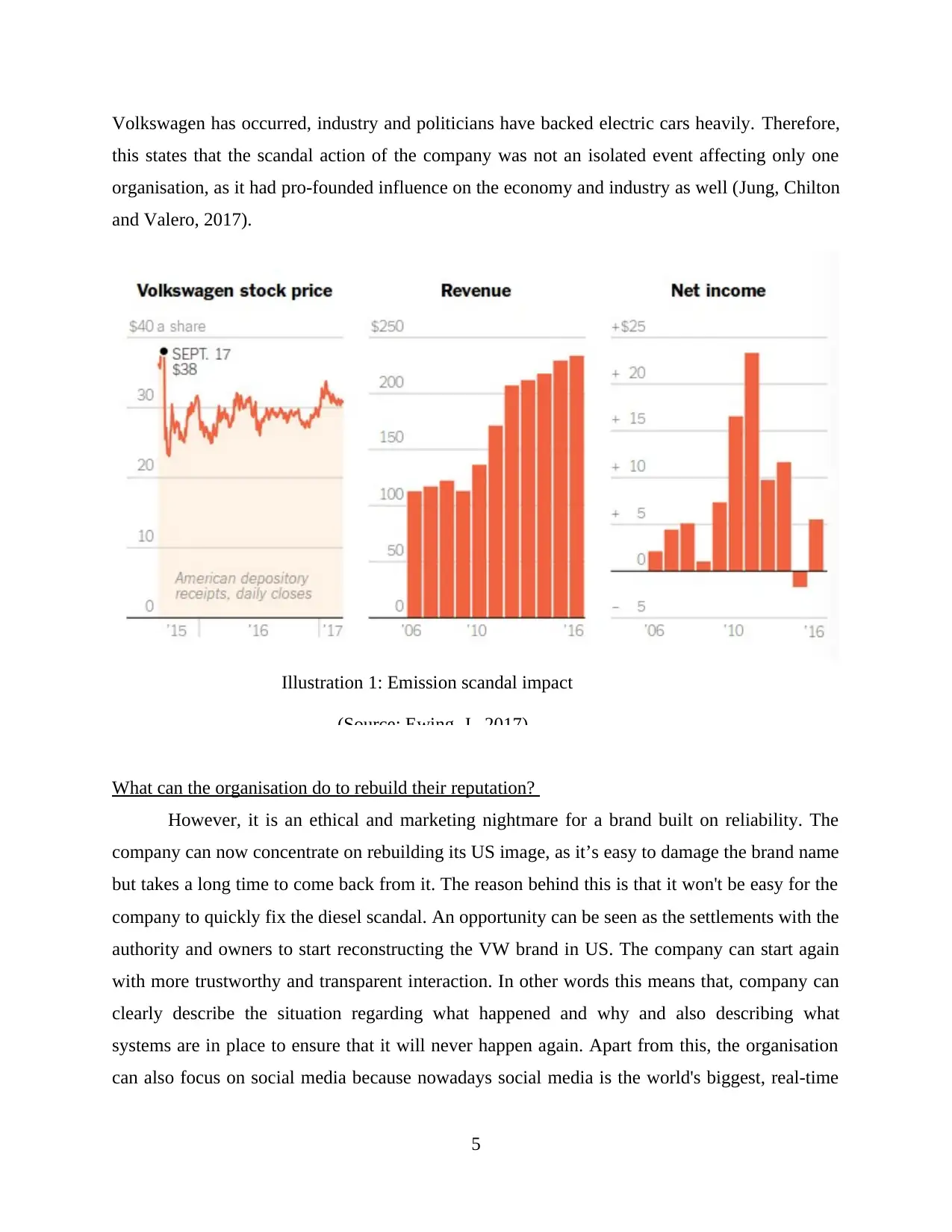
Volkswagen has occurred, industry and politicians have backed electric cars heavily. Therefore,
this states that the scandal action of the company was not an isolated event affecting only one
organisation, as it had pro-founded influence on the economy and industry as well (Jung, Chilton
and Valero, 2017).
What can the organisation do to rebuild their reputation?
However, it is an ethical and marketing nightmare for a brand built on reliability. The
company can now concentrate on rebuilding its US image, as it’s easy to damage the brand name
but takes a long time to come back from it. The reason behind this is that it won't be easy for the
company to quickly fix the diesel scandal. An opportunity can be seen as the settlements with the
authority and owners to start reconstructing the VW brand in US. The company can start again
with more trustworthy and transparent interaction. In other words this means that, company can
clearly describe the situation regarding what happened and why and also describing what
systems are in place to ensure that it will never happen again. Apart from this, the organisation
can also focus on social media because nowadays social media is the world's biggest, real-time
5
Illustration 1: Emission scandal impact
(Source: Ewing, J., 2017)
this states that the scandal action of the company was not an isolated event affecting only one
organisation, as it had pro-founded influence on the economy and industry as well (Jung, Chilton
and Valero, 2017).
What can the organisation do to rebuild their reputation?
However, it is an ethical and marketing nightmare for a brand built on reliability. The
company can now concentrate on rebuilding its US image, as it’s easy to damage the brand name
but takes a long time to come back from it. The reason behind this is that it won't be easy for the
company to quickly fix the diesel scandal. An opportunity can be seen as the settlements with the
authority and owners to start reconstructing the VW brand in US. The company can start again
with more trustworthy and transparent interaction. In other words this means that, company can
clearly describe the situation regarding what happened and why and also describing what
systems are in place to ensure that it will never happen again. Apart from this, the organisation
can also focus on social media because nowadays social media is the world's biggest, real-time
5
Illustration 1: Emission scandal impact
(Source: Ewing, J., 2017)
Paraphrase This Document
Need a fresh take? Get an instant paraphrase of this document with our AI Paraphraser
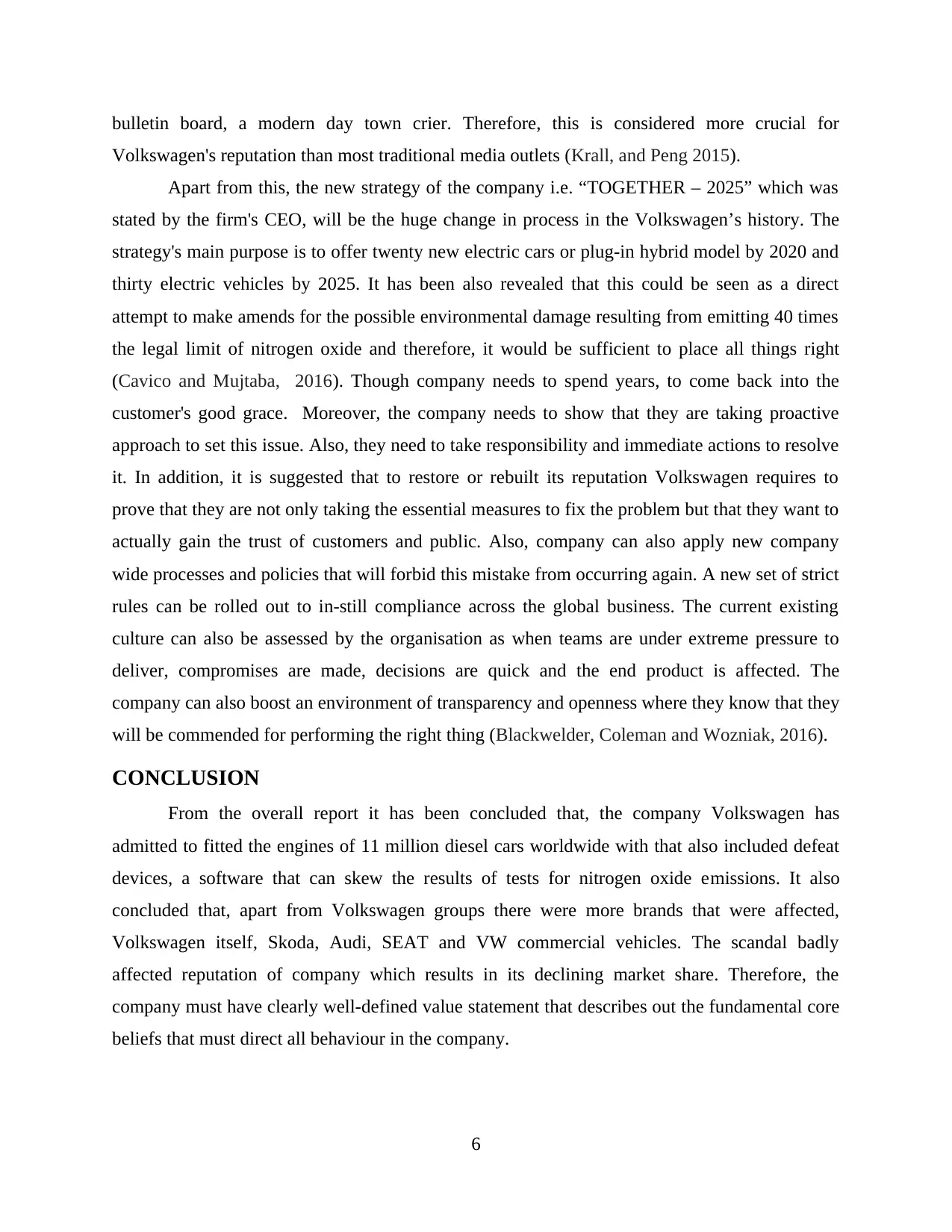
bulletin board, a modern day town crier. Therefore, this is considered more crucial for
Volkswagen's reputation than most traditional media outlets (Krall, and Peng 2015).
Apart from this, the new strategy of the company i.e. “TOGETHER – 2025” which was
stated by the firm's CEO, will be the huge change in process in the Volkswagen’s history. The
strategy's main purpose is to offer twenty new electric cars or plug-in hybrid model by 2020 and
thirty electric vehicles by 2025. It has been also revealed that this could be seen as a direct
attempt to make amends for the possible environmental damage resulting from emitting 40 times
the legal limit of nitrogen oxide and therefore, it would be sufficient to place all things right
(Cavico and Mujtaba, 2016). Though company needs to spend years, to come back into the
customer's good grace. Moreover, the company needs to show that they are taking proactive
approach to set this issue. Also, they need to take responsibility and immediate actions to resolve
it. In addition, it is suggested that to restore or rebuilt its reputation Volkswagen requires to
prove that they are not only taking the essential measures to fix the problem but that they want to
actually gain the trust of customers and public. Also, company can also apply new company
wide processes and policies that will forbid this mistake from occurring again. A new set of strict
rules can be rolled out to in-still compliance across the global business. The current existing
culture can also be assessed by the organisation as when teams are under extreme pressure to
deliver, compromises are made, decisions are quick and the end product is affected. The
company can also boost an environment of transparency and openness where they know that they
will be commended for performing the right thing (Blackwelder, Coleman and Wozniak, 2016).
CONCLUSION
From the overall report it has been concluded that, the company Volkswagen has
admitted to fitted the engines of 11 million diesel cars worldwide with that also included defeat
devices, a software that can skew the results of tests for nitrogen oxide emissions. It also
concluded that, apart from Volkswagen groups there were more brands that were affected,
Volkswagen itself, Skoda, Audi, SEAT and VW commercial vehicles. The scandal badly
affected reputation of company which results in its declining market share. Therefore, the
company must have clearly well-defined value statement that describes out the fundamental core
beliefs that must direct all behaviour in the company.
6
Volkswagen's reputation than most traditional media outlets (Krall, and Peng 2015).
Apart from this, the new strategy of the company i.e. “TOGETHER – 2025” which was
stated by the firm's CEO, will be the huge change in process in the Volkswagen’s history. The
strategy's main purpose is to offer twenty new electric cars or plug-in hybrid model by 2020 and
thirty electric vehicles by 2025. It has been also revealed that this could be seen as a direct
attempt to make amends for the possible environmental damage resulting from emitting 40 times
the legal limit of nitrogen oxide and therefore, it would be sufficient to place all things right
(Cavico and Mujtaba, 2016). Though company needs to spend years, to come back into the
customer's good grace. Moreover, the company needs to show that they are taking proactive
approach to set this issue. Also, they need to take responsibility and immediate actions to resolve
it. In addition, it is suggested that to restore or rebuilt its reputation Volkswagen requires to
prove that they are not only taking the essential measures to fix the problem but that they want to
actually gain the trust of customers and public. Also, company can also apply new company
wide processes and policies that will forbid this mistake from occurring again. A new set of strict
rules can be rolled out to in-still compliance across the global business. The current existing
culture can also be assessed by the organisation as when teams are under extreme pressure to
deliver, compromises are made, decisions are quick and the end product is affected. The
company can also boost an environment of transparency and openness where they know that they
will be commended for performing the right thing (Blackwelder, Coleman and Wozniak, 2016).
CONCLUSION
From the overall report it has been concluded that, the company Volkswagen has
admitted to fitted the engines of 11 million diesel cars worldwide with that also included defeat
devices, a software that can skew the results of tests for nitrogen oxide emissions. It also
concluded that, apart from Volkswagen groups there were more brands that were affected,
Volkswagen itself, Skoda, Audi, SEAT and VW commercial vehicles. The scandal badly
affected reputation of company which results in its declining market share. Therefore, the
company must have clearly well-defined value statement that describes out the fundamental core
beliefs that must direct all behaviour in the company.
6
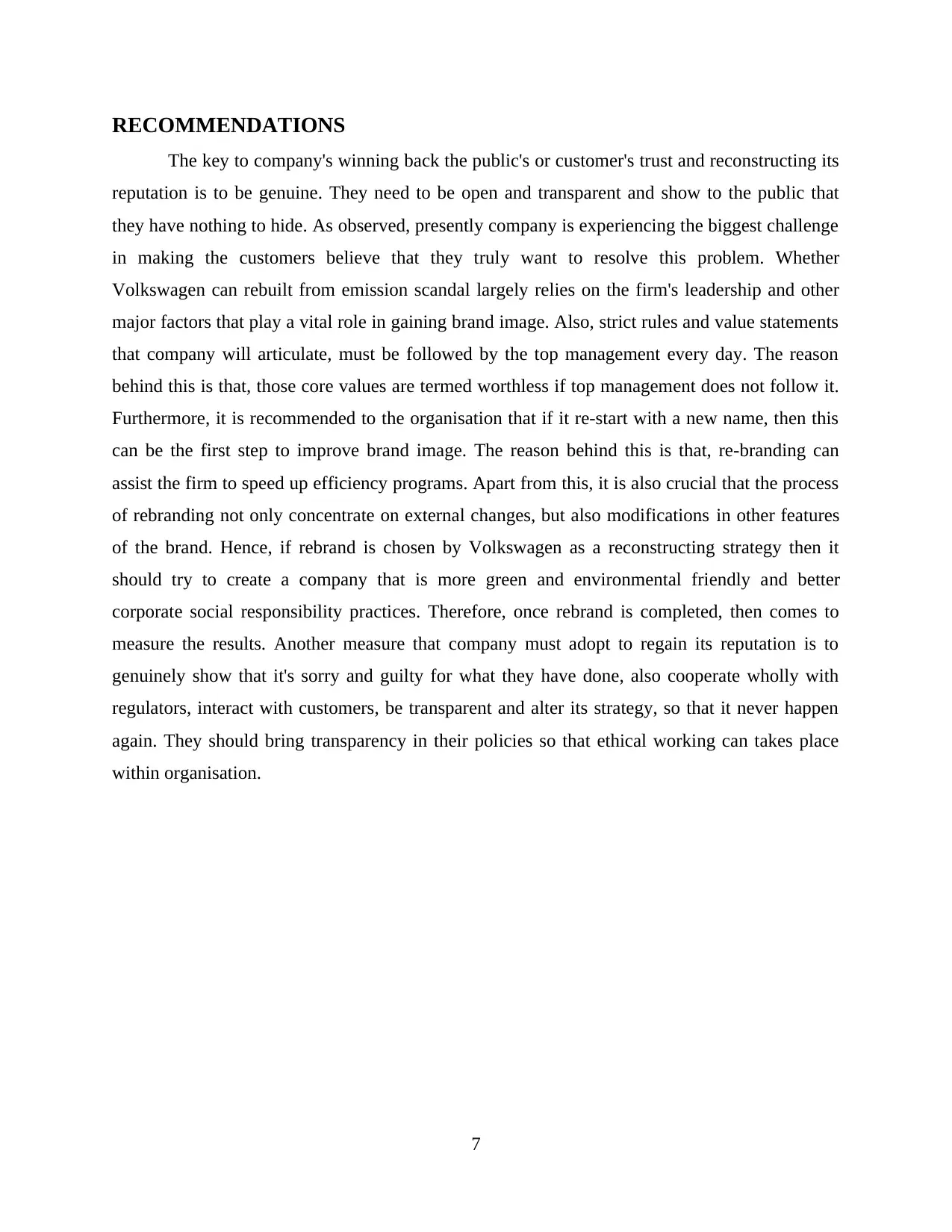
RECOMMENDATIONS
The key to company's winning back the public's or customer's trust and reconstructing its
reputation is to be genuine. They need to be open and transparent and show to the public that
they have nothing to hide. As observed, presently company is experiencing the biggest challenge
in making the customers believe that they truly want to resolve this problem. Whether
Volkswagen can rebuilt from emission scandal largely relies on the firm's leadership and other
major factors that play a vital role in gaining brand image. Also, strict rules and value statements
that company will articulate, must be followed by the top management every day. The reason
behind this is that, those core values are termed worthless if top management does not follow it.
Furthermore, it is recommended to the organisation that if it re-start with a new name, then this
can be the first step to improve brand image. The reason behind this is that, re-branding can
assist the firm to speed up efficiency programs. Apart from this, it is also crucial that the process
of rebranding not only concentrate on external changes, but also modifications in other features
of the brand. Hence, if rebrand is chosen by Volkswagen as a reconstructing strategy then it
should try to create a company that is more green and environmental friendly and better
corporate social responsibility practices. Therefore, once rebrand is completed, then comes to
measure the results. Another measure that company must adopt to regain its reputation is to
genuinely show that it's sorry and guilty for what they have done, also cooperate wholly with
regulators, interact with customers, be transparent and alter its strategy, so that it never happen
again. They should bring transparency in their policies so that ethical working can takes place
within organisation.
7
The key to company's winning back the public's or customer's trust and reconstructing its
reputation is to be genuine. They need to be open and transparent and show to the public that
they have nothing to hide. As observed, presently company is experiencing the biggest challenge
in making the customers believe that they truly want to resolve this problem. Whether
Volkswagen can rebuilt from emission scandal largely relies on the firm's leadership and other
major factors that play a vital role in gaining brand image. Also, strict rules and value statements
that company will articulate, must be followed by the top management every day. The reason
behind this is that, those core values are termed worthless if top management does not follow it.
Furthermore, it is recommended to the organisation that if it re-start with a new name, then this
can be the first step to improve brand image. The reason behind this is that, re-branding can
assist the firm to speed up efficiency programs. Apart from this, it is also crucial that the process
of rebranding not only concentrate on external changes, but also modifications in other features
of the brand. Hence, if rebrand is chosen by Volkswagen as a reconstructing strategy then it
should try to create a company that is more green and environmental friendly and better
corporate social responsibility practices. Therefore, once rebrand is completed, then comes to
measure the results. Another measure that company must adopt to regain its reputation is to
genuinely show that it's sorry and guilty for what they have done, also cooperate wholly with
regulators, interact with customers, be transparent and alter its strategy, so that it never happen
again. They should bring transparency in their policies so that ethical working can takes place
within organisation.
7
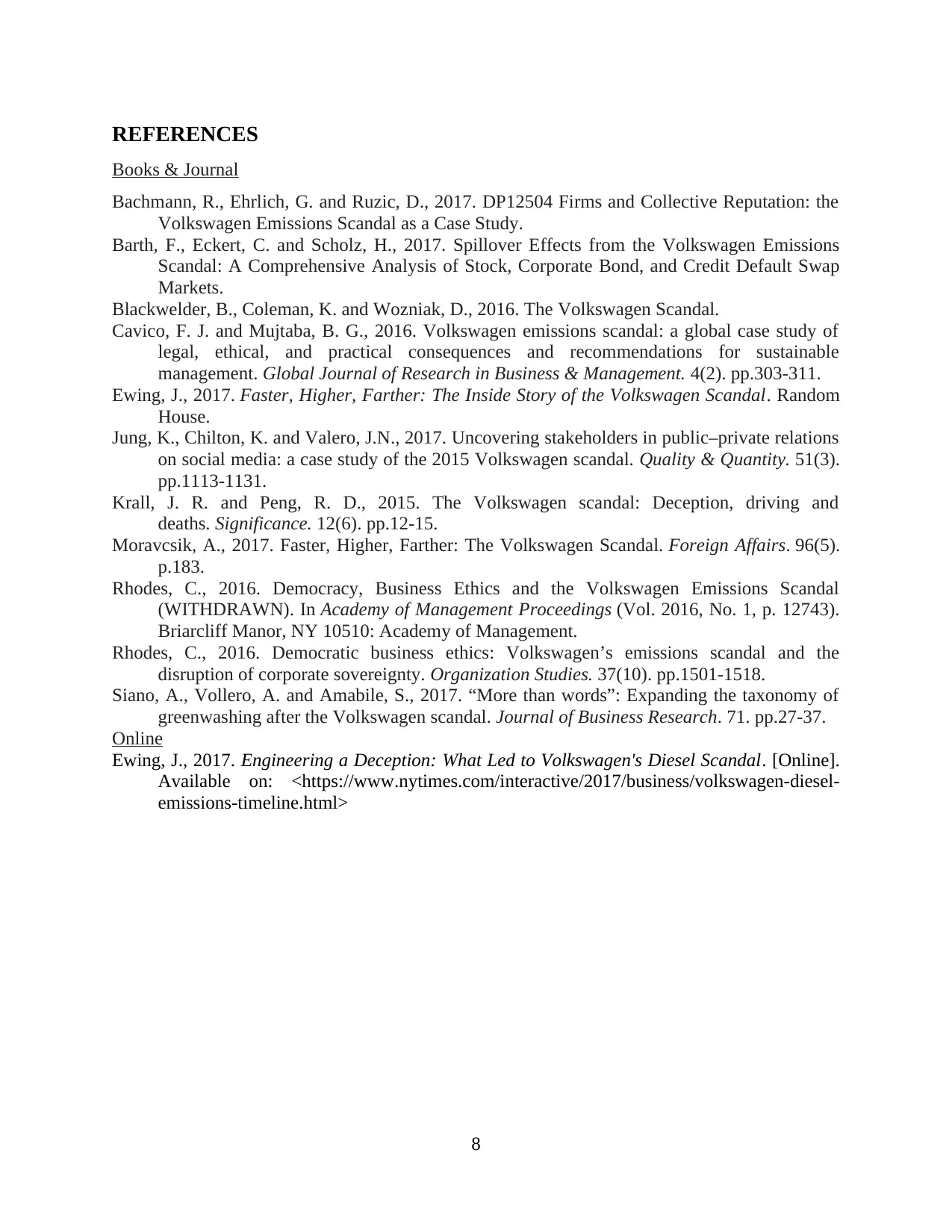
REFERENCES
Books & Journal
Bachmann, R., Ehrlich, G. and Ruzic, D., 2017. DP12504 Firms and Collective Reputation: the
Volkswagen Emissions Scandal as a Case Study.
Barth, F., Eckert, C. and Scholz, H., 2017. Spillover Effects from the Volkswagen Emissions
Scandal: A Comprehensive Analysis of Stock, Corporate Bond, and Credit Default Swap
Markets.
Blackwelder, B., Coleman, K. and Wozniak, D., 2016. The Volkswagen Scandal.
Cavico, F. J. and Mujtaba, B. G., 2016. Volkswagen emissions scandal: a global case study of
legal, ethical, and practical consequences and recommendations for sustainable
management. Global Journal of Research in Business & Management. 4(2). pp.303-311.
Ewing, J., 2017. Faster, Higher, Farther: The Inside Story of the Volkswagen Scandal. Random
House.
Jung, K., Chilton, K. and Valero, J.N., 2017. Uncovering stakeholders in public–private relations
on social media: a case study of the 2015 Volkswagen scandal. Quality & Quantity. 51(3).
pp.1113-1131.
Krall, J. R. and Peng, R. D., 2015. The Volkswagen scandal: Deception, driving and
deaths. Significance. 12(6). pp.12-15.
Moravcsik, A., 2017. Faster, Higher, Farther: The Volkswagen Scandal. Foreign Affairs. 96(5).
p.183.
Rhodes, C., 2016. Democracy, Business Ethics and the Volkswagen Emissions Scandal
(WITHDRAWN). In Academy of Management Proceedings (Vol. 2016, No. 1, p. 12743).
Briarcliff Manor, NY 10510: Academy of Management.
Rhodes, C., 2016. Democratic business ethics: Volkswagen’s emissions scandal and the
disruption of corporate sovereignty. Organization Studies. 37(10). pp.1501-1518.
Siano, A., Vollero, A. and Amabile, S., 2017. “More than words”: Expanding the taxonomy of
greenwashing after the Volkswagen scandal. Journal of Business Research. 71. pp.27-37.
Online
Ewing, J., 2017. Engineering a Deception: What Led to Volkswagen's Diesel Scandal. [Online].
Available on: <https://www.nytimes.com/interactive/2017/business/volkswagen-diesel-
emissions-timeline.html>
8
Books & Journal
Bachmann, R., Ehrlich, G. and Ruzic, D., 2017. DP12504 Firms and Collective Reputation: the
Volkswagen Emissions Scandal as a Case Study.
Barth, F., Eckert, C. and Scholz, H., 2017. Spillover Effects from the Volkswagen Emissions
Scandal: A Comprehensive Analysis of Stock, Corporate Bond, and Credit Default Swap
Markets.
Blackwelder, B., Coleman, K. and Wozniak, D., 2016. The Volkswagen Scandal.
Cavico, F. J. and Mujtaba, B. G., 2016. Volkswagen emissions scandal: a global case study of
legal, ethical, and practical consequences and recommendations for sustainable
management. Global Journal of Research in Business & Management. 4(2). pp.303-311.
Ewing, J., 2017. Faster, Higher, Farther: The Inside Story of the Volkswagen Scandal. Random
House.
Jung, K., Chilton, K. and Valero, J.N., 2017. Uncovering stakeholders in public–private relations
on social media: a case study of the 2015 Volkswagen scandal. Quality & Quantity. 51(3).
pp.1113-1131.
Krall, J. R. and Peng, R. D., 2015. The Volkswagen scandal: Deception, driving and
deaths. Significance. 12(6). pp.12-15.
Moravcsik, A., 2017. Faster, Higher, Farther: The Volkswagen Scandal. Foreign Affairs. 96(5).
p.183.
Rhodes, C., 2016. Democracy, Business Ethics and the Volkswagen Emissions Scandal
(WITHDRAWN). In Academy of Management Proceedings (Vol. 2016, No. 1, p. 12743).
Briarcliff Manor, NY 10510: Academy of Management.
Rhodes, C., 2016. Democratic business ethics: Volkswagen’s emissions scandal and the
disruption of corporate sovereignty. Organization Studies. 37(10). pp.1501-1518.
Siano, A., Vollero, A. and Amabile, S., 2017. “More than words”: Expanding the taxonomy of
greenwashing after the Volkswagen scandal. Journal of Business Research. 71. pp.27-37.
Online
Ewing, J., 2017. Engineering a Deception: What Led to Volkswagen's Diesel Scandal. [Online].
Available on: <https://www.nytimes.com/interactive/2017/business/volkswagen-diesel-
emissions-timeline.html>
8
1 out of 10
Related Documents
Your All-in-One AI-Powered Toolkit for Academic Success.
+13062052269
info@desklib.com
Available 24*7 on WhatsApp / Email
![[object Object]](/_next/static/media/star-bottom.7253800d.svg)
Unlock your academic potential
© 2024 | Zucol Services PVT LTD | All rights reserved.





